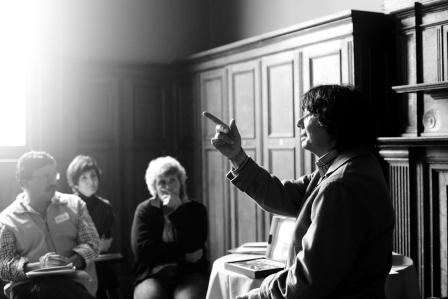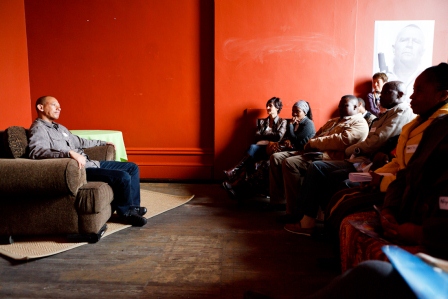Teaching the TRC
Shikaya recently held Teaching the TRC, an interactive event for teachers, to support them in exposing a new generation of learners to the TRC. Over this two-day experience, the participants were able to engage with speakers who were at the heart of the TRC process, as well as with each other, to gain a deeper understanding of the pain and humanity that was revealed through the TRC.

Our first speaker, George Hallett, was the official photographer for the TRC. To hear his anecdotes and explanations of his photos was a real privilege, and gave us an intimate glimpse into the Commission’s internal workings.
We were also fortunate enough to have a poetry reading by Ingrid de Kok, who had attended the TRC hearings as a journalist. Participants were given a copy of her anthology, “Seasonal Fires,” upon registration, and many enjoyed reading the poems whilst hearing them. Her poems dealt with powerful themes of guilt and responsibility, but also questions of how to build a reconciled future. Both George and Ingrid were present in the “fluid conversations” which followed, where participants were invited to engage with the speakers on a more informal and personal level. Liza Key, director of the documentary REwind, also attended the fluid conversations.
Philip Miller, composer of the internationally-acclaimed REwind cantata, spoke about the process of creating a living sound memorial, with vocal arranger Mduduzi Mofokeng. Shikaya had been able to offer 450 students and teachers the opportunity to watch the performance at the Baxter Theatre earlier that week, so the discussion was enthused and engaging. Philip revealed that the name of the cantata arose from the story of Eunice Miya, who found out that her son had been killed when his body was shown on television. When relating this in her testimony she said, “I wish that picture could just rewind.” We were very lucky to have Mrs Miya share her emotional story later in the day.
After Philip and Mduduzi spoke, the musical theme was continued with one of the highlights of the conference: a performance by Vusi Mahlasela, one of the most inspiring African artists of this generation. Some of his songs dealt with the pain of apartheid, whilst others were uplifting, aptly captured the beauty of forgiveness and ubuntu.

The first session of Saturday was held in the Listening Room, which was set up into individual stations with headphones to mirror the experience of the TRC audience. Here participants listened to a 20 minute clip of testimonies, in preparation for the next set of informal conversations with Louis Nel and Abubaker Peterson. They were interpreters at the TRC, and spoke about the personal impact of reporting both the pain of victims and the guilt of perpetrators in the first person.
Perhaps the most intensely moving experience of the conference was the story of Nomonde Calata. She was one of the first to testify at the TRC about the murder of her husband, Fort Calata, one of the Cradock Four. She hopes that by sharing her story she can inspire people to carry on her husband’s legacy, as he was a committed teacher and believed in the power of education.

